Morgan Housel came up with an outstanding article on the art and science of spending money. Basically, he distilled the spectrum of issues we deal with that make spending money more complex than many financial experts think.
There are a few parts that caught my attention.

I always wonder why there are two different outcomes for people that grow up with poorer childhoods.
Some save and save. Some spend and spend.
If you dig into it, I think you’ll see that a disproportionate share of those with the biggest homes, the fastest cars, and the shiniest jewelry, grew up “snubbed” in some way. Part of their current spending isn’t about getting value out of flashy material goods; it’s about healing a social wound inflicted when they were younger.
Even when “wound” is the wrong word, the desire to show the world that you’ve made it increases if you grew up snubbed out of what you wanted. To someone who grew up in an old-money affluent family, a Lamborghini might be a symbol of gaudy egotism; to those who grew up with nothing, the car might serve as the ultimate symbol that you’ve made it.
A lot of spending is done to fulfill a deep-seated psychological need.
I think what we need to detect is whether there is a wound and how bad the wound is.
For some that grew up poor, the would-be hunger but not being looked down upon so much. This might be very different from someone that is often teased for not being able to buy merchandise from GUESS and MCM.
2. Entrapped by spending: Rather than using money to build a life, your life is built around money.
This header used by Morgan defines things well enough.
Money can build a life but some of us money chasers built our life around money after a while without us realizing it.
The devotion to expense regardless of pleasure.
Part of this is the belief that spending money will make you happier. When it doesn’t – either because it never will or because you haven’t discovered purchases that bring joy – your reaction is that you must not be spending enough, so you double down, again and again.
I’ve often wondered how many personal bankruptcies and financial troubles were caused by spending that brought no joy to begin with. It must be enormous. And it’s a double loss: not only are you in trouble, but you didn’t even have fun getting there.
Did I ask myself if I am happy spending on something? People will tell me that if you can afford it then you spend it. Why think so much?
That may be true for a frugal person like me.
But some vicious loop can be rather sinister if you fail to have a way to check yourself.
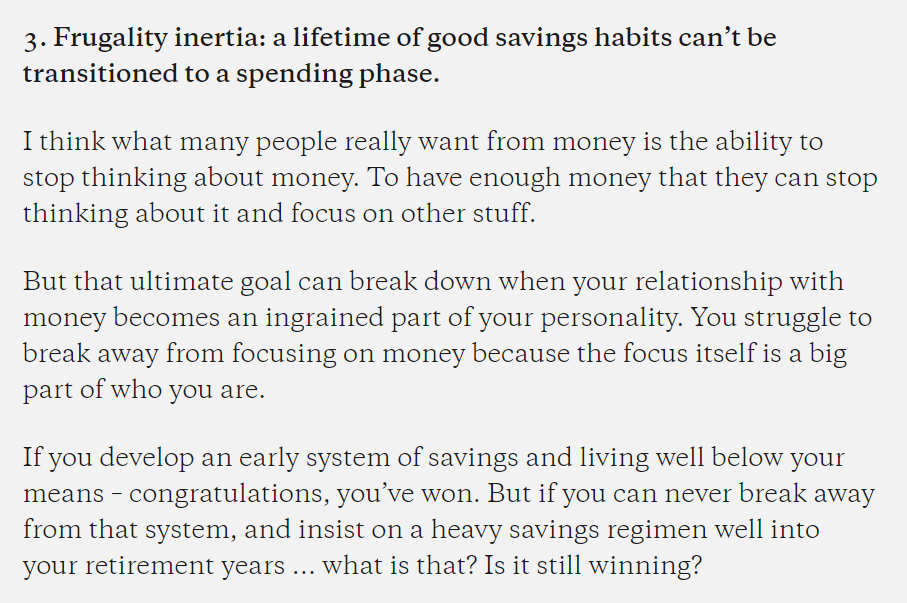
Probably something that people would say I struggled with.
I don’t think I am that bad, but it is true that if you got to a successful financial position because of your frugality, could you turn it off when you want?
Do you fear you might “break something long term” if you turn it off?
I recognized that part of my profession is linked to money in a lot of way and so I have to try doubly hard not to always build my life around money.
To have “enough” that they can stop thinking about it and focus on other stuff… is profound by itself.
I contend that one reason people struggle to break out is that they never felt enough.
Some may come into Providend and trust their adviser enough when the adviser look at their situation and technically assess they have enough but for others… they will have some lingering doubts.
How to alleviate those lingering doubts?
I have ideas but that is a time for another day.
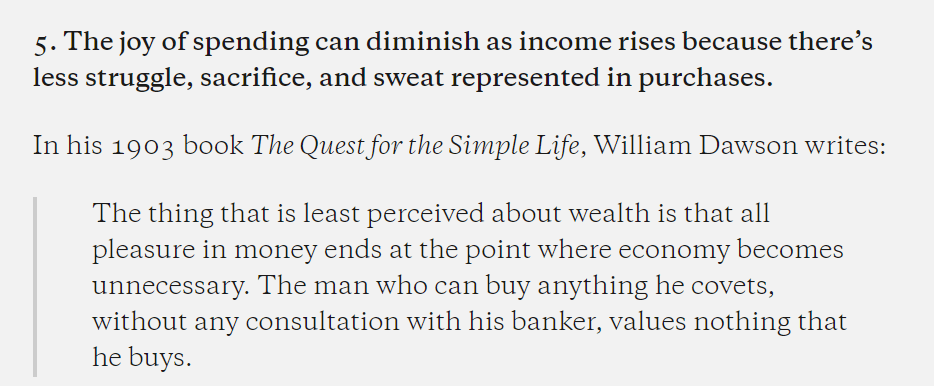
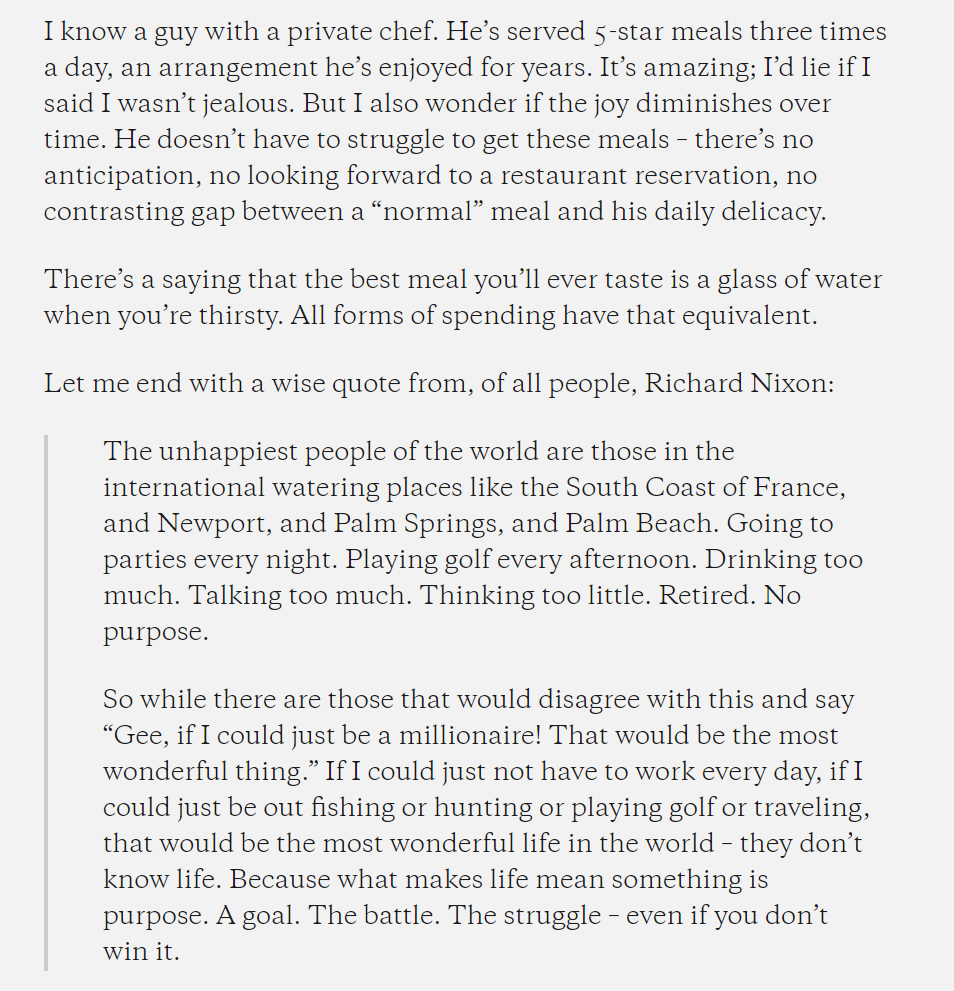
What may make that meal taste sweeter might be that you worked hard for it.
The more I wonder about financial independence planning, the more I would advocate a financial security layer and work for good-to-haves.
It is quite challenging to understand this… until you get there. Then you realize that people need some form of challenge. Sure, some challenges might be in the form of bring up your children as a full-time parent.
But as knowledge workers or even blue collar, we just want to fill useful and after a long while of not feeling useful, it fxxks you up.
But what you want is some sort of financial security.
So the desired life that you look for may not need so much money as you think, and it involves some work.
Parkinson described a fictional finance committee with three tasks: approval of a $10 million nuclear reactor, $400 for an employee bike shed, and $20 for employee refreshments in the break room.
The committee approves the $10 million nuclear reactor immediately, because the number is too big to contextualize, alternatives are too daunting to consider, and no one on the committee is an expert in nuclear power.
The bike shed gets considerably more debate. Committee members argue whether a bike rack would suffice and whether a shed should be wood or aluminum, because they have some experience working with those materials at home.
Employee refreshments take up two-thirds of the debate, because everyone has a strong opinion on what’s the best coffee, the best cookies, the best chips, etc.
We don’t spend enough of our time thinking about the money problems we are most concerned with because it is harder to get round.
The opposite is also damn cute.
We spend so much time debating about little things but why there is less debate over big things is because less sophisticated brains totally shut down.
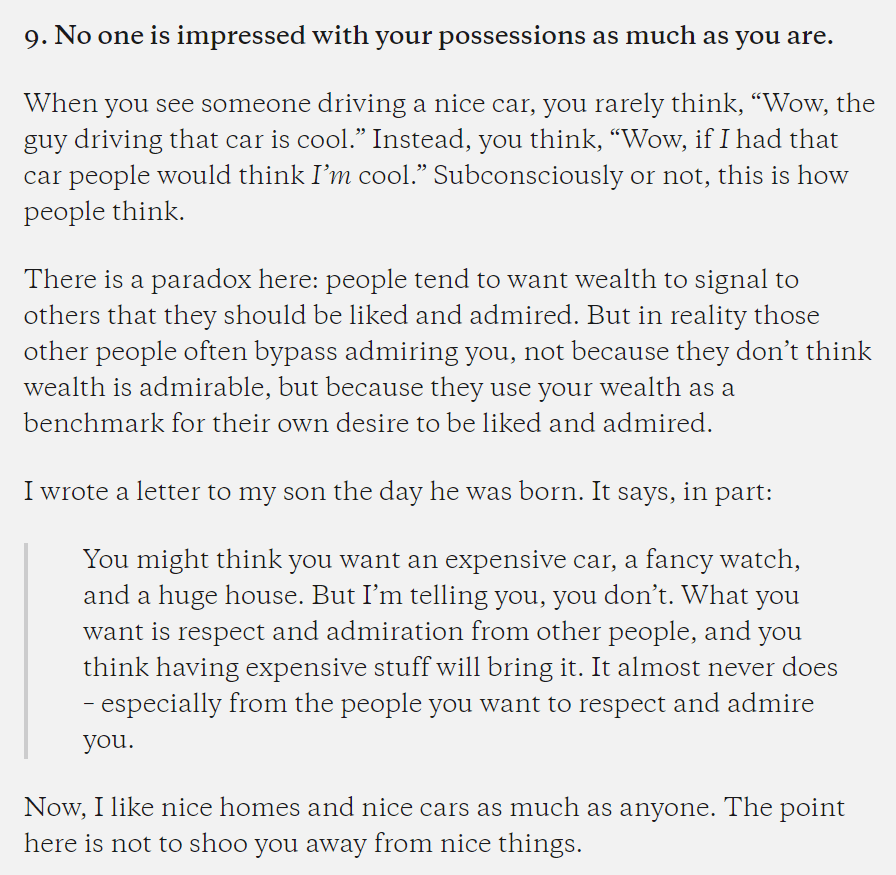
Morgan just wishes to tell us that we overrate how much others pay attention to us.
But in some professions such as wealth management, the hard truth might be there is a minimum presentation standards because in each of our minds, we do equate possessions and posture with your competency, even if some of us don’t think that way.
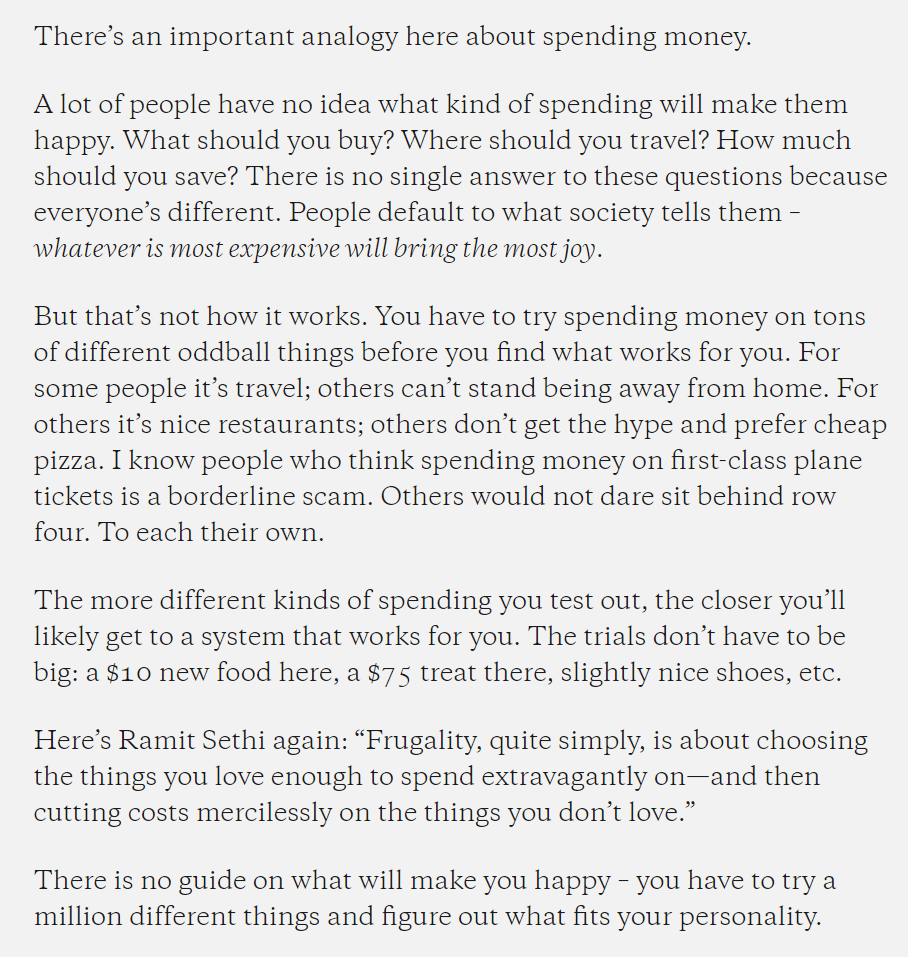
How much you need for financial independence can keep shifting.
That is what many might not realize.
Why?
If you have the time, you explore more things. Last time you think A, B, C gives you joy, but now with D, E and F, you realize it is real fun!
But that means you might need more… now.
And every Tom, Dick and Harry view their spending as a recurring amount that goes on perpetually.
If that is your view, then what you need just keeps increasing.
If you spend your years in frugality, you might really need to try different things to discover real fun.
My friend did that to his parents.
He will take money from them even as an adult and just spend and give them things. If not, how would the parents learn what is fun?
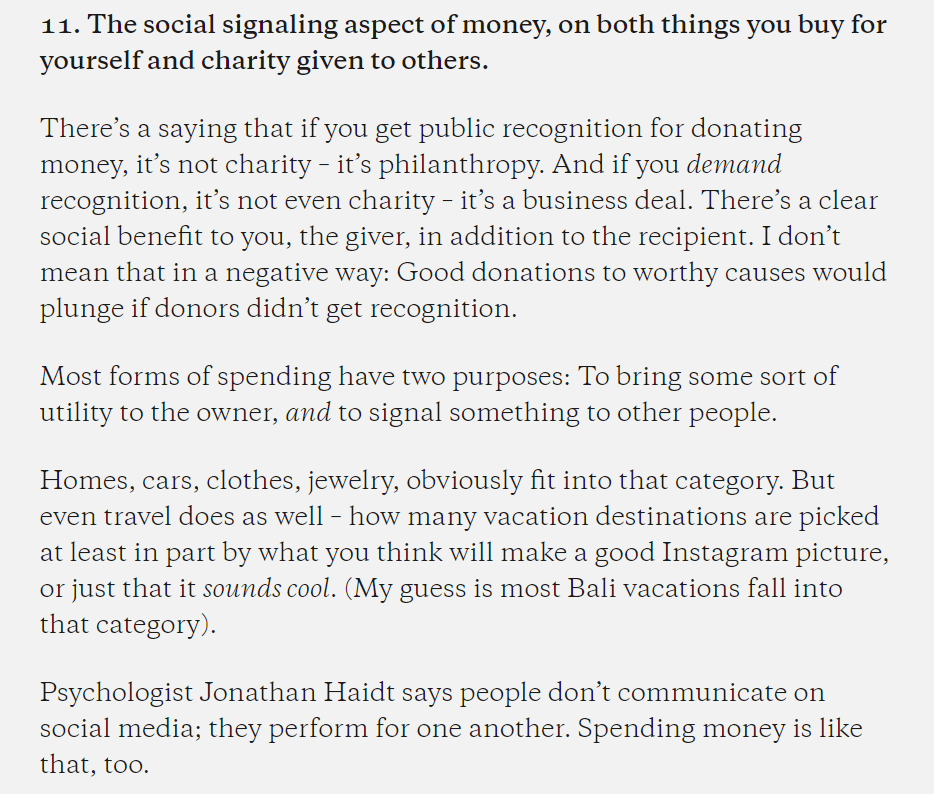
I think many people have different takes on doing charity work. Some might find it pretentious.
But Morgan raises a good point that some of this stuff we do is that we are signalling to others.
Dressing shabbily deliberately in an even where you know everyone is going to be nice also tells others you have a message.
If you say that others dress up nicely are pretentious, then sometimes what you are doing to make a point might also be pretentious.
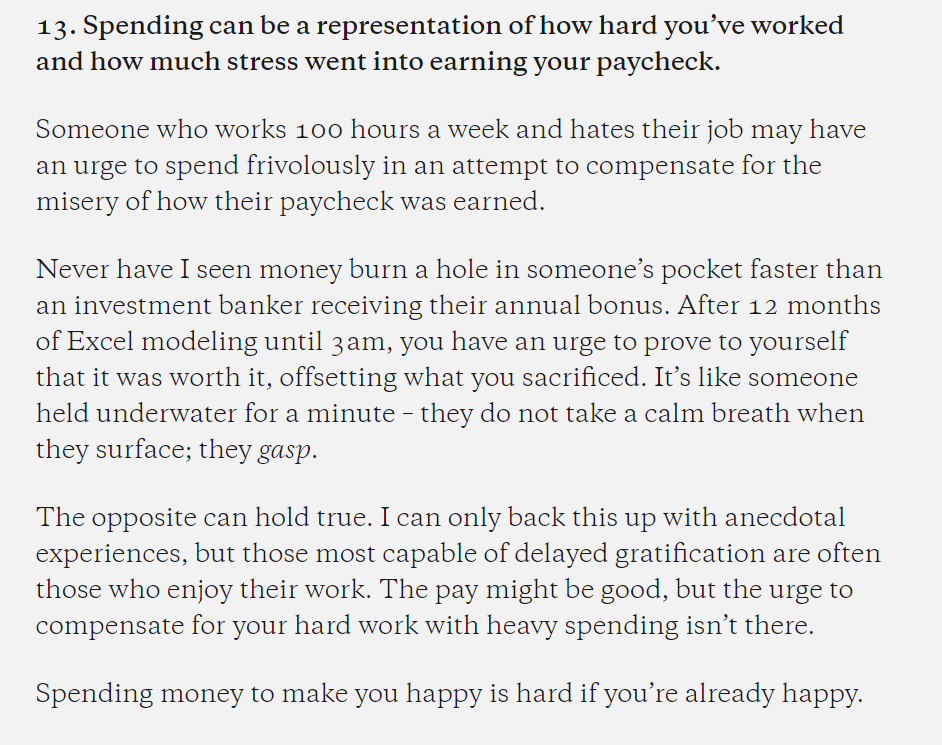
The essence of FI.
Be able to recognize that some of your spending is fuel to overworking.
What if you are not overworked anymore?
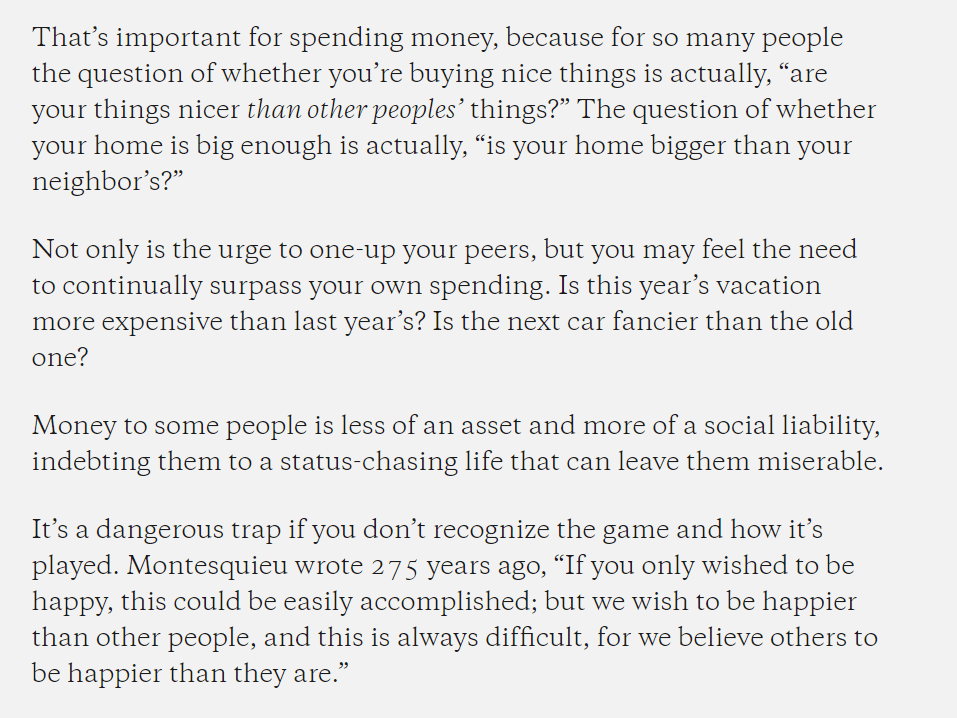
Something insidious that I see in chat groups sometimes.
Why do we glorify frugality and beat others with Hermes bags?
新年快乐 from Kyith at Investment Moats.
I invested in a diversified portfolio of exchange-traded funds (ETF) and stocks listed in the US, Hong Kong and London.
My preferred broker to trade and custodize my investments is Interactive Brokers. Interactive Brokers allow you to trade in the US, UK, Europe, Singapore, Hong Kong and many other markets. Options as well. There are no minimum monthly charges, very low forex fees for currency exchange, very low commissions for various markets.
To find out more visit Interactive Brokers today.
Join the Investment Moats Telegram channel here. I will share the materials, research, investment data, deals that I come across that enable me to run Investment Moats.
Do Like Me on Facebook. I share some tidbits that are not on the blog post there often. You can also choose to subscribe to my content via the email below.
I break down my resources according to these topics:
- Building Your Wealth Foundation – If you know and apply these simple financial concepts, your long term wealth should be pretty well managed. Find out what they are
- Active Investing – For active stock investors. My deeper thoughts from my stock investing experience
- Learning about REITs – My Free “Course” on REIT Investing for Beginners and Seasoned Investors
- Dividend Stock Tracker – Track all the common 4-10% yielding dividend stocks in SG
- Free Stock Portfolio Tracking Google Sheets that many love
- Retirement Planning, Financial Independence and Spending down money – My deep dive into how much you need to achieve these, and the different ways you can be financially free
- Providend – Where I used to work doing research. Fee-Only Advisory. No Commissions. Financial Independence Advisers and Retirement Specialists. No charge for the first meeting to understand how it works
- Havend – Where I currently work. We wish to deliver commission-based insurance advice in a better way.
- New 6-Month Singapore T-Bill Yield in Late-April 2024 to Drop to 3.70% (for the Singaporean Savers) - April 18, 2024
- Golden Nuggets from JPMorgan Guide to Retirement 2024. - April 16, 2024
- Be Less Reliant on Banks and Build Stronger Capital Markets by Pushing for Better Shareholder Dividend and Buyback Yield - April 14, 2024


Ed
Monday 23rd of January 2023
Very nice article, illuminating and enlightening.
YAP YAP
Saturday 21st of January 2023
新年快乐 Kyith.
I spent the last hour and a half struggling to stay awake reading financial news. Your piece woke me up like a magic pill. Thanks for the insight!
Kyith
Sunday 22nd of January 2023
新年快乐 Yap Yap! Glad it is some sort of tonic!
Keith
Saturday 21st of January 2023
Thanks. I enjoyed this article.
Kyith
Sunday 22nd of January 2023
Thank you.